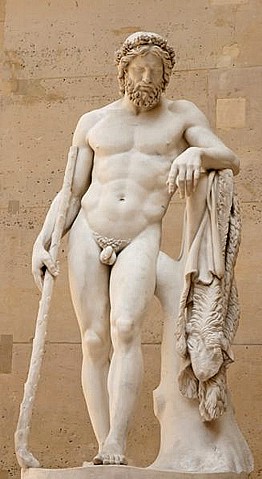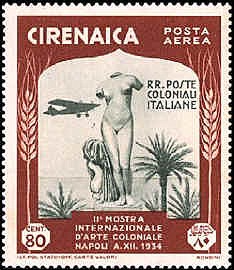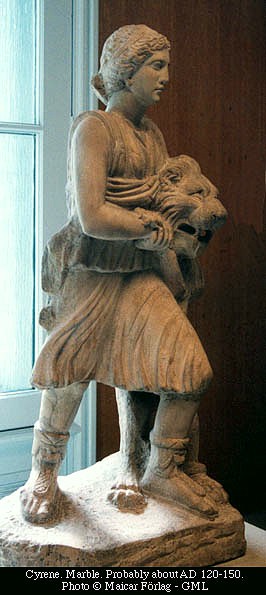Lessico
Aristeo

Aristée
dieu des jardins – 1817
François-Joseph Bosio- Parigi Louvre
Figlio di Apollo![]() e della ninfa Cirene, che Apollo rapì e portò in
Libia dove divenne eponima della città di Cirene, i cui resti sono venuti alla luce a Shahhat (come è oggi detta
Cirene), in Cirenaica
e della ninfa Cirene, che Apollo rapì e portò in
Libia dove divenne eponima della città di Cirene, i cui resti sono venuti alla luce a Shahhat (come è oggi detta
Cirene), in Cirenaica![]() .
.
Aristeo fu allevato dalle ninfe. Sposò Autonoe, figlia di Cadmo, e fu
padre di Atteone. Protettore delle greggi e delle messi, insegnò agli uomini
come coltivare l’ulivo, cagliare il latte, raccogliere il miele. S’innamorò
di Euridice, moglie di Orfeo![]() , che, mentre cercava di sfuggire alle sue molestie, fu morsa da un
serpente e morì.
, che, mentre cercava di sfuggire alle sue molestie, fu morsa da un
serpente e morì.
Per castigo Apollo o le ninfe compagne di Euridice gli distrussero gli
alveari. Aristeo, dietro consiglio della madre e poi di Proteo, immolò
quattro tori e quattro giovenche all’ombra di Euridice e riebbe uno sciame
di api uscite dalle carcasse degli animali. Di lui parla Virgilio![]() nelle Georgiche
IV, 315 e seguenti:
nelle Georgiche
IV, 315 e seguenti:
[315] Quis deus hanc, Musae, quis nobis
extudit artem?
Unde nova ingressus hominum experientia cepit?
Pastor Aristaeus fugiens Peneia Tempe,
amissis, ut fama, apibus morboque fameque,
tristis ad extremi sacrum caput adstitit amnis
[320] multa querens atque hac adfatus
voce parentem:
'Mater, Cyrene mater, quae gurgitis huius
ima tenes, quid me praeclara
stirpe deorum,
si modo, quem perhibes, pater est Thymbraeus Apollo,
invisum fatis genuisti? aut quo tibi nostri
[325] pulsus
amor? quid me caelum sperare iubebas? [...]


Cyrene the mother of Aristaeus
A minor god in Greek mythology, which we read largely through Athenian writers, Aristaeus or Aristaios, "ever close follower of the flocks", was the culture hero credited with the discovery of many useful arts, including bee-keeping; he was the son of Apollo and the huntress Cyrene. Aristeus ("the best") was a cult title in many places: Boeotia, Arcadia, Ceos, Sicily, Sardinia, Thessaly, and Macedonia; consequently a set of "travels" was imposed, connecting his epiphanies in order to account for these widespread manifestations.
If Aristaeus was a minor figure at Athens, he was more prominent in Boeotia, where he was "the pastoral Apollo" and was linked to the founding myth of Thebes by marriage with Autonoë, daughter of Cadmus, the founder. Aristaeus may appear as a winged youth in painted Boeoptian pottery, similar to representations of the Boreads, spirits of the North Wind.
According to Pindar's ninth Pythian Ode and Apollonius' Argonautica (II.522ff), Cyrene despised spinning and other womanly arts and instead spent her days hunting, but, in a prophecy he put in the mouth of the wise centaur Chiron, Apollo would spirit her to Libya and make her the foundress of a great city, Cyrene, in a fertile coastal plain. When Aristaeus was born, Pindar sang, Hermes took him to be raised on nectar and ambrosia and be made immortal by Gaia. The Myrtle-nymphs taught him useful arts and mysteries, how to curdle milk for cheese, how to tame the Goddess's bees and keep them in hives, and how to tame the wild oleaster and make it bear olives. Thus he became the patron god of cattle, fruit trees, hunting, husbandry and bee-keeping. He also taught humanity dairy skills (including cheesemaking) and the use of nets and traps in hunting.
When he was grown, he sailed from Libya to Boeotia, where he was inducted into further mysteries in the cave of Chiron the centaur. In Boeotia, he was married to Autonoe and became the father of the ill-fated Actaeon, who inherited the family passion for hunting, to his ruin, and of Macris, who nursed the child Dionysus.